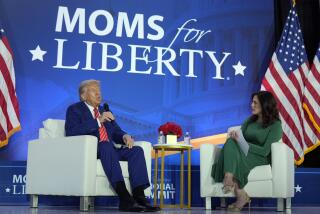Clinton Affirms Case for U.S.-Israel Bond : Mideast: With Rabin seated beside him, President says peace process depends on ties.
President Clinton, in a sweeping affirmation of U.S. support for Israel, said Sunday night that peace in the Middle East is possible only because of solidarity between Washington and Jerusalem.
With Prime Minister Yitzhak Rabin seated at his side, Clinton said Israel was able to move toward peace with its Arab adversaries because “we made it clear that no one could drive a wedge between us.”
“Our support for the security and well-being of the Jewish state is unshakable,” Clinton added in a speech to the American Israel Public Affairs Committee, the main pro-Israel lobbying group of the U.S. Jewish community.
Before their joint appearance, Clinton and Rabin met at the White House to review Israel’s peace negotiations with Syria. Although there had been speculation that Rabin was bringing plans for a new initiative to invigorate the sluggish talks, neither man gave a hint of any change in negotiating strategy.
Instead, Clinton reviewed past U.S. military assistance to Israel, in an apparent reply to Rabin’s Likud Party opponents who have complained that if Israel agrees to return the strategic Golan Heights as part of a peace agreement, the country’s security will be eroded.
“In any agreement that Israel concludes with Syria, it will have the ability to defend itself--by itself,” the President said, ignoring Washington’s customary stand as impartial mediator in the Arab-Israeli conflict.
At the same time, Clinton said, the U.S. government must be in a position to reward--with foreign aid funds--Syria, Jordan, Egypt and other Arab states that agree to peace with Israel. He lashed out at “backdoor isolationists” in the Republican Party who claim to support Israel while trying to cut the overall foreign aid budget.
He said the peace process “depends on our ability to support everyone that takes risks for peace.” If Washington reneges on promises to the Arab parties, Clinton said, it will damage Israel’s security even if the United States continues to provide $3 billion a year to Israel, by far the largest such allocation to any nation.
Without naming them, Clinton referred to Republican budget-cutters as “people who claim to be friends of Israel” who, if they get their way, will “make Israel less secure and peace less likely.”
For his part, Rabin told Clinton, “During your term as President, Israeli-American relations (have reached) an unprecedented high.”
Rabin scoffed at Israelis and American Jews who suggest that his government should not negotiate with implacable foes like Syria.
“We have no friends there (in the Middle East),” he said. “We have no one with whom we didn’t fight before we reached peace.” But he insisted: “We have to continue, we must continue and peace will prevail.”
Senate Majority Leader Bob Dole (R-Kan.), scheduled to address the same audience today, is expected to announce plans to introduce legislation requiring the U.S. government to move its embassy in Israel from Tel Aviv to Jerusalem. Although the measure is immensely popular with much of the American Jewish community, the Israeli government is ambivalent because such a step would enrage the Arabs and could torpedo the peace process.
Although Rabin referred repeatedly to Jerusalem as Israel’s “undivided and eternal capital” during his emotional speech, he did not once mention the controversy over the U.S. Embassy.
In Jerusalem earlier Sunday, members of Rabin’s Cabinet equivocated on the subject. Foreign Minister Shimon Peres, who presided over the weekly Cabinet meeting in Rabin’s absence, pleaded with ministers not to publicly address the issue, citing its political sensitivity.
“I think that our involvement at this point in this debate weakens our position and there is no need for our involvement,” Peres told Israel’s Army Radio after the session.
The ministers ignored Peres’ plea for restraint. Some told reporters after the Cabinet meeting that they believe the United States should not relocate the embassy at this point, while others said they would welcome the move.
“It is not the right time,” Cultural Affairs Minister Shulamit Aloni said. “It seems to me it has a smell of provocation and even involvement in negotiations that must be between us and the Palestinians.” Aloni told reporters that she does, however, support the notion of all embassies eventually moving to Jerusalem.
But Education Minister Amnon Rubinstein said he did not understand what the fuss was about, because the United States has talked about relocating the embassy to West Jerusalem, which Israel has controlled since 1948.
The Cabinet’s uncertain response brought a hail of criticism from the opposition Likud Party. Likud leaders expressed disbelief that any Israeli government would not immediately and enthusiastically welcome Senate interest in moving the embassy to Jerusalem.
The political reality is that the groundswell of Senate support for moving the embassy could not have come at a worse time for Rabin’s government. The government already is facing a storm of criticism in the Arab world for its decision to confiscate about 130 acres of mostly Arab-owned land in East Jerusalem to build Jewish neighborhoods. Palestine Liberation Organization Chairman Yasser Arafat has demanded a U.N. Security Council debate on the matter.
Following the Cabinet meeting, Peres traveled to Cairo for talks with Palestinian leaders over the next phase of the Israeli-Palestinian peace process. The meeting was swamped by the continuing furor over the confiscation of East Jerusalem land.
After meeting for almost three hours with Egyptian Foreign Minister Amir Moussa, Peres defended the Israeli decision as necessitated by the city’s expanding population.
“We cannot freeze life,” he said. “It is not a political development. It is, if you want, a demographic one.”
Moussa disagreed.
“We continue to believe that confiscating land and building on this land is contrary to international law, and we are not in a position to accept the argument as presented by the foreign minister, Mr. Peres,” he said.
Palestinian negotiator Nabil Shaath accused Peres of straying “180 degrees from the truth. This is Palestinian land. If it was Jewish land, there was no need to provoke confiscation.”
Shaath also accused the United States of tacitly backing the seizure by not taking a more forceful position against it. The U.S. State Department has called the confiscation plan “not helpful” to the peace process, but the United States has opposed a call by the Arab League to bring the issue before the U.N. Security Council.
Times staff writers Mary Curtius in Jerusalem and Craig Turner in Cairo contributed to this report.
More to Read
Sign up for Essential California
The most important California stories and recommendations in your inbox every morning.
You may occasionally receive promotional content from the Los Angeles Times.






